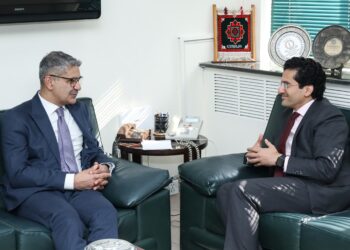ISLAMABAD : Power Division’s workshop on Competitive Trading Bilateral Contract Market (CTBCM) framework and the upcoming wheeling auction process has not satisfied the private sector and experts on many issues linked to the future course of liberalization of power market in the country .
The session was formally inaugurated by Federal Minister for Energy (Power Division) Sardar Awais Leghari, who welcomed participants and reaffirmed the government’s firm commitment to the timely launch of Pakistan’s competitive electricity market.
Presentations on Market Design and Reforms was made in workshop that featured detailed presentations on the CTBCM design, regulatory milestones, and institutional reforms since 2018, including amendments to the NEPRA Act and issuance of supporting rules, regulations, licences Code, and creation of the ISMO.
Head of Market Operations at the Independent System and Market Operator (ISMO), presented the CTBCM design, highlighting its alignment with international best practices while tailored to Pakistan’s ground realities. He stressed that the new market will enhance competition in power generation and allow bulk power consumers to choose suppliers directly—helping reduce tariffs, boost industrial competitiveness, and support economic growth.
The Director of Market Operations at ISMO also briefed participants on the federal government’s draft guidelines for wheeling auctions, particularly addressing wheeling quantum allocation through auction with principle of higher stranded costs bid for one time and one year applicability and principles of fair and transparent allocation of wheeling quantum explained.
The stakeholder feedback and private sector concerns conveyed during the interactive Q&A session, private sector participants appreciated the government’s commitment to fair allocation of wheeling quantum but urged simplification of the auction guidelines and auction process framework. They emphasized that stringent pre-qualification requirements—such as multiple grid studies, SECP registration, and MoUs with BPC’s etc—could act as barriers to entry in market. Instead, they recommended a simpler auction process to encourage greater participation and liquidity with bid bond and bid performance taken as commitment for allocation and such conditions should be left for successful bidders to comply at time of grant of licence pursuant to rules and regulations. It was also discussed and challenged that that wheeling allocation target is limited to 800 MW over five years which is against the original market design and ISMO representative clarified that careful approach had to be adopted without impacting the sector affordability and its is subject to upward revision in years to come on the market participants demand and successful role out of evolution of market, with 200 MW auction planned in the first year and 150 MW in subsequent years shall be allocated through auctions to be conducted in multiple rounds in years. Stakeholders strongly demanded and suggested said auction timelines be committed by ISMO for 2-3 months time period to complete and it was also highlighted that capping individual allocations at max 25% of auction be ensured to maximize participation in market for enhanced liquidity and efficiency and effective testing of the market operations and settlement systems being deployed and avoid the concentration in market, it was also commented that limiting the size of market to 800 MW in five years does not impact and call no financial impact on sector but policy and regulatory framework must be tested and demonstrated with max participation with per party limit set to minimum side for max wheeler participate so that benefits of systems and capability tastings are achieved at least. Once of the commentator said that world has evolved and reached to real-time and dynamic market design participation and operations with energy traded and settled at period of 5-15 minutes, where demand and supply participants are invisible to each other and power exchanges are responsible as trading platform, Pakistan is delayed and striving to launch a market with bilateral contract design at with minimum condition of two years bilateral contract among parties and settlement period of one month at hourly marginal price, a simple design and decades delayed reform and suggested that Pakistan may not overstay on this approach and design for long and fast transit to Power Exchanges development and trading platform models to ensure liquidity and efficiency in the market that really impacts and benefits to consumers and economy of Pakistan.
There were multiple confusions in the minds of physical and online interested participants where key policy clarifications were made by Minister of Energy, he clarified that wheeling charges will be based solely on actual network costs determined by NEPRA, excluding debt-servicing surcharges that could create unnecessary burdens on wheelers and added that any positive contribution of stranded cost discovered through auction will only apply in the first year of transaction; beyond that, successful bidders will pay only the regulator annually determined standard use of system charges. The objective is to create an enabling environment for competition at generation segment, where DISCOs have no competing interests, and improve investment of network where DISCOs have natural monopoly and is source of their revenues and returns, ensure affordability of consumers, and reliable supply through resilient network behavior with desired service quality and delivery system—not revenue generation through stranded costs which is cost of legacy not future market participants.
Technology, reliability, and the future resilient Grid needs was the call of the workshop and eye opening statement by industry experts, including CEO of REON from the private sector, who highlighted viable alteratives of the grid with rapid technological changes and efficiency improvements—particularly in solar, wind, and battery storage— he mentioned technology impact on consumer behavior and alarmed the participants that several industrial companies from textile and cement sectors adding as base load for grid, including major cement in south and, have already shifted to captive hybrid renewable systems to ensure their affordability and address reliability concerns due to the fragile grid behaviour and don’t care attitude of the grid managers to consumers persistent complaints for timely connections, poor quality of power and unreliable delivery system.
Panelists stressed the need for reliable network, integrated planning, and ancillary services markets to complement renewable growth and achieve the sustainability targets. They cautioned that unless distribution companies improve reliability and efficiency, more consumers will exit the grid, it was mentioned that there has to be 10% annual targeted reduction for losses and improvements in reliability and recovery targets followed the current year target, the cost of such inefficiencies in consumer tariff is around 30%, which is huge and makes the industrial operations unviable and demands industry for investment in non-core business activities that impacts negatively to country economy, the panelist said investors are investing in Ethopia where grid is affordable and reliable and investing substantial capital in non-core business activities to ensure affordable and reliable power, had this reliability and affordability been ensured by national grid, the industry could have avoid this investment and could use this capital in their industrial activities expansion resulting into more export and creating positive impact on balance of payment, inflation and stable exchange rates leading stable economy and employment creation. Participants demand for immediate enforcement of accountability of transmission and distribution companies boards and managers, recommending that annual loss reduction along with recovery and reliability improvement targets set at least 10% starting from current state as it add to circular debt, if they do not perform their hefty fees and remunerations should be confiscated and held accountable and passed back to consumers.
With regard to market system developments and transparency, ISMO showcased its newly developed Website along with data transparency platform visualised, aimed at providing real-time marginal pricing information and supporting capacity building. Stakeholders requested that demand and price forecasts be made available for efficient trade participation and imbalance cost risks mitigations, rather than historical data, be made available for better planning of merchant transactions. Participants also stressed upon the disclosure of the hourly demand forecasts at country level and also demanded for generators scheduling and dispatch data ensuring that most viable economic dispatch is ensured by the ISMO any deviation from economic dispatch should also be notified on next day of system operations along with marginal price and associated impacts.
The workshop concluded with strong support from stakeholders for the liberalisation of Pakistan’s electricity market, while urging simplification of the wheeling auction framework and removal of unnecessary barriers and all the inputs given by stakeholders should be incorporated before the guidelines are finalised, taken for approval to Cabinet and its implementation . It was also emphasised by participants that ISMO shall strive operating independently pursuant to its licenced obligations ensuring the transparent and fair market and system operations, further on the request of participants the date for seeking comments on auction guidelines through on email (shaheer.ali@ismo.gov.pk) was extended to September 26, 2025 with request to participants to share their detailed written comments for improvement of framework in light of enlightening discussions during the workshop.
Rehan Javed, representing FPCCI, appreciated the long-due stakeholder consultation and welcomed the ISMO and Ministry teams for holding the seminar in Karachi — the city that drives nearly 50 percent of Pakistan’s exports. He posed critical questions to the panel: whether K-Electric is ready and comfortable to allow CTBCM implementation; if ISMO is legally empowered to conduct auctions given that price discovery is part of tariff, which lies strictly in NEPRA’s domain; who will ultimately bear the stranded cost of the 800 MW allocation; and on what basis the 800 MW cap was calculated, since all scenarios presented are supply-surplus rather than demand-surplus, raising doubts about whether such a cap truly avoids socializing capacity costs onto others.
Ends















